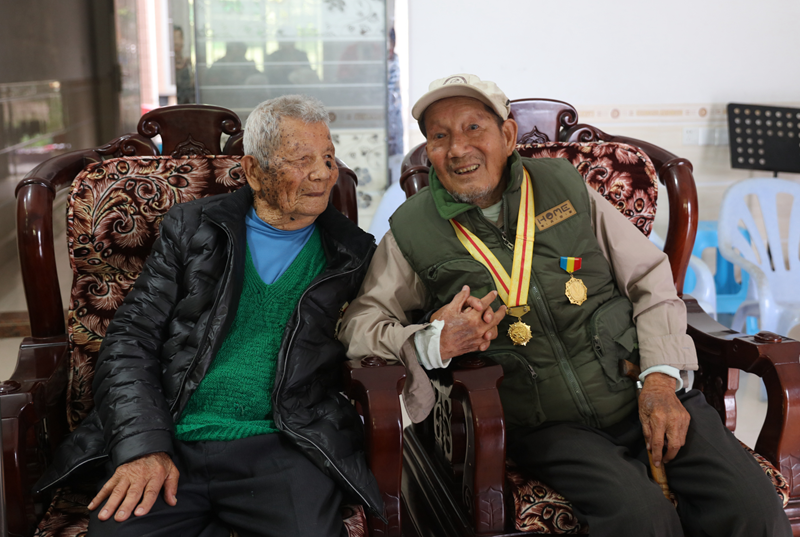On January 14, 2020, Mr. Chen, a volunteer of China Democratic National Construction Associations of Jiangsu Province and Nanjing, Amity Foundation, and Nanjing Civil Resistance against Japan Museum, paid visits to two Christian Anti-Japanese War Veterans in villages in Fujian Province.
In Pinghe, Chen visited Zhuang Yuanfang and He Shuncong and handed to each of them a letter from those organizations.
The letter read as follows: "Victory belongs to the strong. You once jubilated with pride and shed your blood. Our most respected veteran, you have heroically been through wars against enemies! More than 70 years have since passed. Today, we want to tell that our homeland has persevered, our children stand tall, and peace still persists."
He gave them solace, presented them with gifts for their contributions to the nation, and listened to their stories of anti-Japanese war and wishes.
Last April, the 92-year-old veteran Zhuang saw his brother in the Lord and also his old comrade in Dongkeng Village, He Shuncong. Two senior people met in tears and tightly linked their fingers to each other.
Zhuang was born in 1921 and is an honorary deacon of the well-known Pinghe Wuzhai Xinmei Gospel Village Church. Born in 1926, He Shuncong was once a believer in Dongkeng Village. His house is next to the chapel. They are classmates.
In the autumn of 1944, they responded to the call of the National Government and voted to participate in the Youth Army, giving up their professionalism. Recalling the process of the military in the past, the two old soldiers were still very excited. In the same year, with other over 130 young people from Pinghe, Zhuang Yuanfang was incorporated into the machine gun division, and He Shuncong was into the division's direct labor barracks. The two were then separated.
In 1945, Zhuang Yuanfang's division moved to Fuzhou to participate in the Fuzhou population census. He studied Japanese at nights and planned to join the vision of conquering Taiwan across the sea. Afterward realistically there were not enough ships, the division soon went to Zhejiang to take a ship from Shanghai to Xiamen. He was transferred to Sichuan, Ankang and other places with the army. In 1949, he went to the army in Enshi, Hubei Province for an uprising. Later, he carried a severance pass with the signature of General Peng Dehuai and went back to his hometown with thousands of difficulties. Before the civil war in 1946, the two veterans retired and returned to their hometowns, teaching in two primary schools, offering literacy education for the masses at nights, and becoming colleagues in the peace education front.
Mr. Chen said that although the veterans were getting older, their glory will never fade away. He mentioned that before the Spring Festival begins, volunteers would pay visits to the ten other living veterans in various cities of Fujian province, to give them solace as well as transmit new year greetings and blessings.
- Translated by Lin Changfeng











